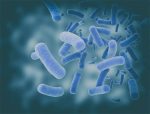NP001 May Slow ALS Progression by Limiting ‘Leaks’ of Gut Bacteria
Best trial responses in patients with high blood levels of inflammatory markers

Neuvivo’s NP001 (sodium chlorite) may help slow the progression of amyotrophic lateral sclerosis (ALS) by taming the systemic inflammation caused by gut bacteria leaking into the bloodstream, according to a new analysis of Phase 2 trial data.
The findings point to microbial translocation, which occurs when bacteria break through the epithelial barrier that lines the gut and move into circulating blood, as a silent culprit in ALS.
Notably, the treatment seems to stop microbial translocation in patients by reducing the pro-inflammatory activity of macrophages, a type of innate immune cell, and boosting their ability to help in would healing — particularly in helping to repair the epithelial barrier in the gut.
“We have long-postulated that NP001, as a regulator of the innate immune system, restores the balance between macrophages that initiate inflammation and those that promote wound healing,” Michael McGrath, MD, PhD, Neuvivo’s chief scientific officer, said in a company press release.
Treating ALS by focusing on macrophages, pro-inflammatory immune cells
“The current study links the regulation of the innate immune system by NP001 with ALS disease modification, an approach potentially applicable to other inflammatory diseases,” said McGrath, who also is a professor emeritus of medicine at the University of California San Francisco (UCSF).
The study, “Macrophage-Targeted Sodium Chlorite (NP001) Slows Progression of Amyotrophic Lateral Sclerosis (ALS) through Regulation of Microbial Translocation,” was published in the journal Biomedicines.
ALS is caused by the progressive damage and death of motor neurons, the nerve cells responsible for voluntary movement. While this neuronal damage occurs in the central nervous system (CNS, the brain and spinal cord), recent data suggests blood macrophage involvement in the earliest processes of ALS via attacks on nerve cells outside the CNS.
“ALS was traditionally considered to affect primarily the central nervous system, but recent research supports what we have postulated — that ALS originates as a systemic [whole-body] immunologic reaction,” said McGrath.
NP001 was designed to interfere with the workings of macrophages, reducing their pro-inflammatory behavior and causing them to become anti-inflammatory instead. This is expected to reduce inflammation and ease ALS symptoms.
Combined data from Phase 2a (NCT01281631) and Phase 2b (NCT02794857) trials showed that NP001 slowed disease progression in a group of patients, ages 40 to 65, with high levels of inflammation at their study’s start (a baseline measure).
To determine if these clinical responses were associated with macrophage regulation, Neuvivo researchers, in collaboration with a team at UCSF, examined blood samples collected from 52 people who participated in the Phase 2a trial. All were within three years of symptom onset and had been randomly assigned to infusions of NP001 (2 mg/kg) or a placebo for six months.
Changes in inflammatory markers linked to ‘positive clinical outcomes’
The recent analyses included only trial participants within that 40–65 age range (mean baseline age, 54.7), where the best responses to treatment were observed. About half (55.8%) had high levels of C-reactive protein (CRP), a biomarker of systemic inflammation.
As observed in the Phase 2a trial, patients with these higher inflammation levels experienced a significant slowing of disease progression with NP001 treatment. More treated patients in this group also were deemed “non-progressors” compared with those on a placebo (40% vs. 11.8%).
“Macrophage regulation led to slowing, and in some cases halting of disease progression,” said Ari Azhir, PhD, Neuvivo’s CEO.
In turn, no differences were observed between NP001 and placebo in the group of patients with low levels of inflammation at baseline. A slowing of ALS progression was evident only among patients with blood levels of CRP “above the median study value (1.13 mg/L),” the researchers noted.
“ALS is now recognized as such a heterogeneous disease that in 2019 the FDA [U.S. Food and Drug Administration] published guidelines encouraging treatment developers to identify subsets of patients most responsive to their therapeutic approach,” said Azhir.
In keeping with those guidelines, this analysis focused on inflammatory markers associated with microbial translocation, the study noted. Over a six-month period, it found that blood biomarkers indicating such translocation were significantly lower among those treated with NP001 than among placebo patients.
In addition to C-reactive protein, decreases were observed for sCD163, a protein that regulates immune cell movement into tissues, and IL-18, which activates the inflammasome — a group of proteins that sense danger and help mount an inflammatory response against it.
Blood biomarkers indicating lesser inflammation also were significantly higher in patients treated with NP001, as was epidermal growth factor (EGF), a protein that plays a key role in wound healing and repair of the gut’s epithelial barrier.
“These biomarker results linked to the positive clinical trial outcome confirm that regulation of macrophage activation may be an effective approach for the treatment of ALS,” the researchers wrote.
“NP001 is currently the only treatment in development with a known mechanism of action linking biomarker changes to positive clinical outcomes in a subset of ALS patients,” Azhir said. “We are working to make treatment available as quickly as possible to people currently living with ALS who may benefit.”







